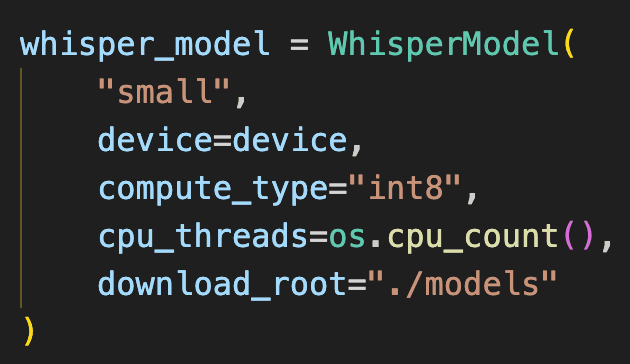Voice technology is revolutionizing how we interact with digital platforms. With Gen Z users increasingly preferring voice commands over traditional text input, the shift toward voice-first experiences has never been more critical. Enter VocRT - an open-source, comprehensive Voice-to-Voice AI solution that's changing the game for developers, businesses, and educational institutions worldwide.
What Makes VocRT Different?
Unlike traditional chatbots that rely on text-based interactions, VocRT offers ultra-low latency voice-to-voice conversion with seamless interruption handling. This means your users can have natural, flowing conversations with AI - just like talking to a human.
Key Features That Set VocRT Apart:
Real-Time Processing
Experience conversations with minimal delay, creating natural dialogue flows that keep users engaged.
Complete Privacy
All processing happens locally on your machine - no data ever leaves your environment, ensuring 100% privacy compliance.
Advanced RAG Capabilities
Seamlessly integrate unlimited PDFs, documents, spreadsheets, presentations, and web content—enabling intelligent, context-aware AI conversations.
Zero API Costs
No recurring charges or usage limits - once installed, VocRT runs completely offline.
Quick Installation Guide
Prerequisites
- Python 3.10 (required)
- Node.js 16+ and npm
- Docker for Qdrant vector database
- Git for cloning repositories
1. Clone the Repository
git clone https://huggingface.co/anuragsingh922/VocRT
cd VocRT2. Set Up Python Environment
python3.10 -m venv venv
source venv/bin/activate # On Windows: venv\Scripts\activate
pip install -r requirements.txt3. Install eSpeak
Ubuntu/Debian
sudo apt-get update
sudo apt-get install espeakmacOS
Install Homebrew if not already present, then install eSpeak:
# Install Homebrew if not present
/bin/bash -c "$(curl -fsSL https://raw.githubusercontent.com/Homebrew/install/HEAD/install.sh)"
# Install eSpeak
brew install espeakWindows
1. Download from the eSpeak official website
2. Run the installer and follow the setup instructions
3. Add the installation path to your system PATH environment variable
Verification
Test your eSpeak installation with the following commands:
# Check eSpeak version
espeak --version
# Test eSpeak functionality
espeak "VocRT installation successful!"4. Launch Backend Services
cd backend
npm install
npm run dev5. Start Frontend
cd frontend
npm install
npm run dev6. Initialize Qdrant Database
docker run -p 6333:6333 -p 6334:6334 \
-v "$(pwd)/qdrant_storage:/qdrant/storage:z" \
qdrant/qdrantAccess Points
http://localhost:6333http://localhost:6333/dashboardhttp://localhost:6334Once the container is running, you can access these endpoints to interact with your Qdrant database.
7. Configure Environment
Edit your .env file with your preferred LLM provider:
# LLM Configuration
OPENAI_API_KEY=your_openai_api_key_here
GEMINI_API_KEY=your_gemini_api_key_here
LLM_PROVIDER=google # or 'google' for Gemini
LLM_MODEL=gemini-2.0-flash # or your preferred model7. Download Required Models
Whisper STT Model
The Whisper model will be automatically downloaded when you first run the application. Simply specify your preferred model size in app.py:

Model Size Recommendations:
- tiny: Fastest processing, lower accuracy (~39 MB)
- base: Balanced performance and accuracy (~74 MB)
- small: Better accuracy, moderate speed (~244 MB)
- medium: High accuracy, slower processing (~769 MB)
- large: Highest accuracy, slowest processing (~1550 MB)
9. Launch VocRT
python3 app.pyNavigate to http://localhost:3000 and start your first voice conversation!
Real-World Applications
Customer Support Revolution
Transform your customer service with AI agents that understand context, remember previous interactions, and provide human-like responses. VocRT's interruption handling means customers can ask follow-up questions naturally.
Educational Enhancement
Create interactive learning experiences where students can ask questions verbally and receive immediate, contextual responses based on course materials you've uploaded.
Accessibility Solutions
Empower users with visual impairments or mobility challenges to interact with your platform through natural voice commands.
Healthcare Innovation
Develop secure, HIPAA-compliant voice interfaces for patient interactions, appointment scheduling, and medical information retrieval.
Performance Optimization Tips
Hardware Recommendations
Configuration Best Practices
What's Next?
VocRT represents just the beginning of voice-first AI interactions. With over 90 combined downloads across Hugging Face and Docker platforms, the community is rapidly growing.
The upcoming VocRT 3.0 promises even more groundbreaking features, including enhanced multilingual support, improved voice synthesis quality, and advanced conversation management.
Join the Voice AI Revolution
Ready to integrate cutting-edge voice AI into your project? VocRT's MIT license and comprehensive documentation make it the perfect choice for developers who want full control over their voice AI implementation.
Transform your user experience with VocRT - where privacy meets performance in real-time voice AI.
